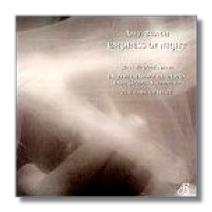
The Internet's Premier Classical Music Source
Related Links
- Latest Reviews
- More Reviews
-
By Composer
-
Collections
DVD & Blu-ray
Books
Concert Reviews
Articles/Interviews
Software
Audio
Search Amazon
Recommended Links
Site News
 CD Review
CD Review
Amy Beach

Empress of Night
- Piano Concerto Op. 45
- Piano Quintet Op. 67
Joanne Polk, pianist
Lark Quartet
English Chamber Orchestra/Paul Goodwin
Arabesque Z6738
It's all here in Amy Beach's century-old Piano Concerto in C Sharp minor: forty-foot wells of grief, waves of piano-orchestra contention, ragings against the night, and more than a few bows to great Johannes. Plunge into this river and you will emerge so wet with angst you'll have a doomed love affair. But let's not go overboard. This concerto is not a great work by Dvořákian or Brahmsian standards. However, it will take you deep into the vale of late Romanticism. Joanne Polk, fresh from her stellar three volume series of Beach's solo piano works, attacks this work with undiluted passion. Her Scherzo, every bit as wry as Beach intended, never slips into burlesque. Beach claimed that the struggle and affirmation at the finale is autobiographical. Of course it is! Aren't all romantic concertos about the individual asserting herself against powerful orchestrations? Speaking of the orchestra, Paul Goodwin's conducting of the English Chamber Orchestra is solid and professional. His style is muscular: lean when it must be and pumped up during the more effusive moments.
While the Piano Concerto is notable, the Piano Quintet is wondrous. Beach seems more suited to smaller forms – she wrote only one piano concerto – perhaps because the distance to the raw nerve is shorter, unfettered by all those contentions and tuttis. F Sharp minor was another morose key for her, darker even than C Sharp minor. Here Brahms' ghost must have appeared to her in a seance, you can hear the distant wail of his Piano Quintet. Beach was no fool. She knew the quotation would pay off. Her one piano quintet became her most frequently played chamber work. The Lark Quartet works wonders with Polk in this work, giving it ample room to sigh like winds through a white pine forest. Polk's coloration, her contrasts between pianissimo and fortissimo moments, are similar to Sviatoslav Richter's rendition of César Franck's Piano Quintet. Fedoras off to Arabesque Recordings for rescuing these two works against obscurity. They're charmingly excessive. They're pure Americana.
Copyright © 2001, Peter Bates


















